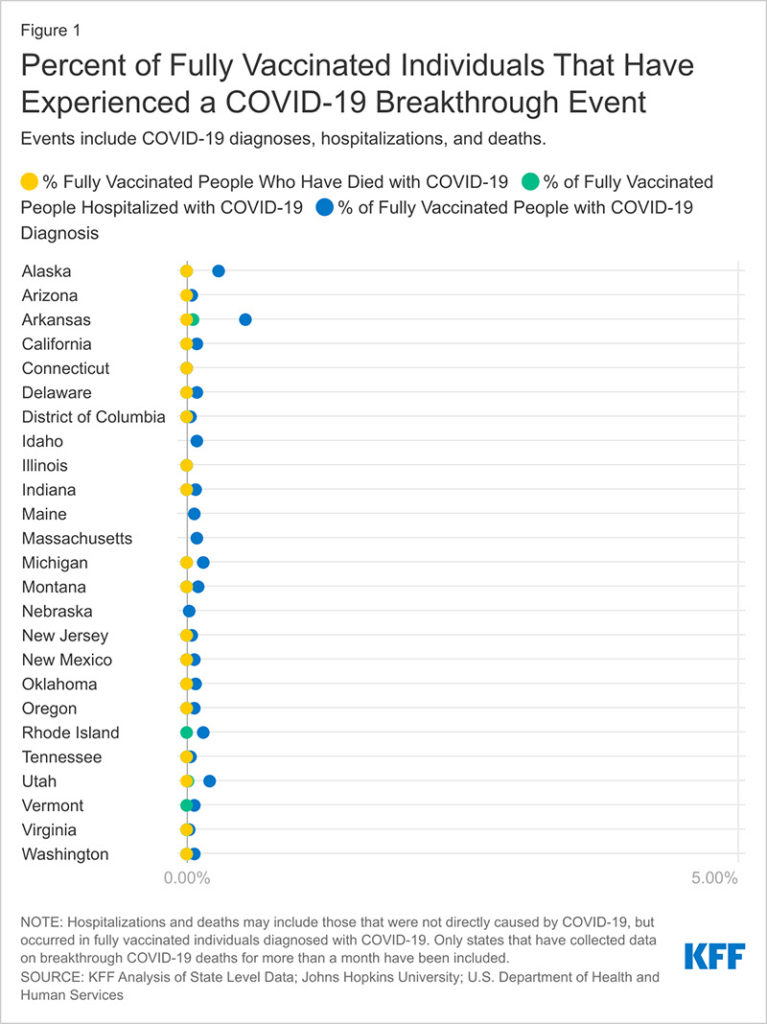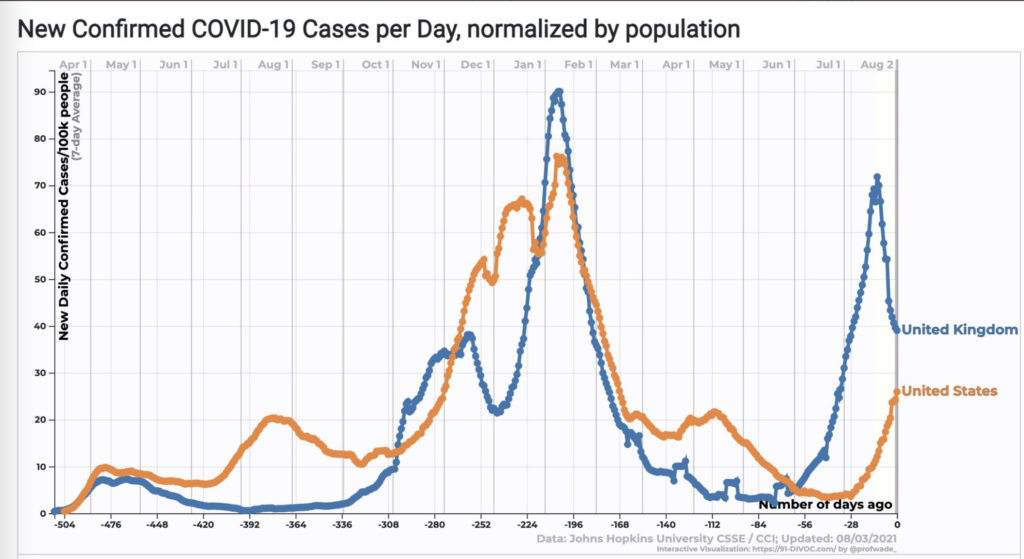Volcanoes are erupting in The Philippines, but on-fire Australia received some welcome rain. The Iran war cries have been called off and The Donald’s military powers are about to be hamstrung by the Senate. Meanwhile, his impeachment trial is starting, and we’re all on Twitter for a front-row seat.
What Could Go Right? A closer look at breakthrough infections
This week in our newsletter, steadying news about the Delta variant, a decline in police shootings in many US cities, and more.
This is our weekly newsletter, What Could Go Right? Sign up here to receive it in your inbox every Thursday at 6am ET. You can read past issues here.
It’s the Delta variant’s world, and we’re just trying to make sense of it. It’s a tough job, especially with such New York Times specials as “Delta Variant as Contagious as Chickenpox.” As one friend asked who saw the link but didn’t click for fear of more bad COVID news, “How contagious is chickenpox?”
Tough, too, to keep a cool head when you do click, and learn that Delta causes breakthrough infections in the vaccinated and that the infected and vaccinated carry just as much virus as the unvaccinated. And there’s no one on earth who reads the sentence “The Delta variant is more transmissible than the viruses that cause MERS, SARS, Ebola, the common cold, the seasonal flu and smallpox” without at least a little shiver running down their spine. (Side note: Why do we always have to compare everything to Ebola, especially when these days we may have seen the end of large Ebola outbreaks forever? It just freaks people out.)
That particular Times story is a perfect example of a piece of reporting being factually accurate but taken as a whole, irresponsible, in that it leaves most readers, unless they are reading extremely closely and critically, with the impression that Delta is putting us back at square one. The piece’s headline was widely circulated, but you have to get to the last paragraph—and how many do?—for this steadying quote from virologist John Moore: “The sky isn’t falling,” he said. “And vaccination still protects strongly against worse outcomes.”
How strongly? Let’s look at the numbers from the United States. Of the states where data is available, the Kaiser Family Foundation reports that among the fully vaccinated, “breakthrough cases, hospitalizations, and deaths are extremely rare events.” Rare means well below 1%, ranging from .01% in Connecticut to .29% in Alaska.

A closer look: the x-axis ends at 5%.
According to data compiled by NBC News from 38 states, of the 164 million vaccinated Americans, less than .08% have tested positive for breakthrough infections, and .001% have died. You have much better odds of dying from a stroke.
These numbers are critical not only for a proper understanding of risk but also to recognize that vaccinated people can only transmit the disease if they catch it in the first place. Very small numbers do, something that the Times piece does mention, but vastly underemphasizes. There’s also the point made by former CDC head Tom Frieden that “There’s no 1-1 relationship between high viral load and infectivity.”
In the words of health reporter Andre Picard of The Globe and Mail, “Let’s be crystal clear about one thing from the outset: Vaccinated people are not as likely to get and spread coronavirus as unvaccinated people. Not even remotely so. What is true is in the rare instance someone has a breakthrough infection, they can spread the virus as readily. That is very different. And it’s leaving the false impression that COVID-19 vaccines don’t work. In fact, vaccines are working remarkably well, even against the new curveballs thrown at them.” (To read the full piece you must register for a free account.)
Of course, we are just one of many in the Internet chorus who say that the unvaccinated and the vaccinated are playing two completely different ball games right now in regard to the Delta variant. If you have the vaccine available to you, we leave you with the words of Senator Marco Rubio:
Another upper to the downer news about Delta is that its caseload seems to peak and wane relatively quickly, which is what the United Kingdom is seeing and even what happened in India, although we aren’t sure why. Turns out that after the big July 19th end of restrictions, COVID cases in the UK are dropping, and some expect the US to follow suit in the coming weeks.

Last quick shots around the pandemic: the Food and Drug Administration (FDA) expects to fully approve Pfizer-BioNTech next month. Long COVID is rare in children. Canada is now the world leader in the fully vaccinated. Meanwhile, the small Himalayan nation of Bhutan, home of Gross National Happiness, if that GDP-alternative rings any bells for you, is following up their highly successful COVID response with a highly successful vaccination rollout, fully inoculating more than 85% of their adult population after a large COVAX donation of second doses came in mid-July. Their COVID death toll still stands at two people.
Before we go, this article was a winner on Twitter. Did you know that 86 of the US’ 100 most populous cities reported 30% fewer total arrests in 2019 than they did in 2013? From Oregon to Louisiana, policy and policing changes have led to a decline in low-level arrests, which has in turn reduced the number of police shootings without a rise in crime.
Below in the links section, the big deals in the bipartisan infrastructure plan, pandemic aid programs are set to cut US poverty in half, global GDP and life expectancy are going up, the potential mental health benefits of stepping back from smartphones and elite sports, and more.
From us: A brief announcement that we’re continuing our event vacation through August. We’ll return in the fall with an anticipated lineup of events on constructive journalism, philanthropy, and more. Tune in after Labor Day!
Progress, Please
(Found good news? Tweet at us @progressntwrk or email.)
Other good stuff in the news
United States:
- Pandemic aid programs are spurring a record drop in poverty | The New York Times
- Cleaner and more connected: What’s in the new bipartisan infrastructure plan—and why it’s a big deal | Vox
- The plan could also make going to the airport less miserable | Vox
- The House passed federal spending bills without abortion restrictions for the first time in decades | Time
- A Columbus pilot program that uses social workers instead of police for drug and mental health emergencies will be expanded | The Hill
- In what may be the biggest change in alcohol laws since Prohibition, at least 35 states have legalized takeaway cocktails | The Economist
- The FDA approved a “game-changing” breast cancer treatment | The Hill
- Washington state county became the first in the US to ban new fossil fuel infrastructure | The Guardian
- New Jersey is pushing to double solar power over the next five years | NBC10 Philadelphia
International:
- In Australia, vulnerable 12- to 15-year-olds will be eligible for the Pfizer vaccine starting next week | The Sydney Morning Herald
- Life is actually getting better: Global GDP per capita and life expectancy have been rising for decades | GZERO
- Australia reached more than 30% female representation on top company boards without gender quotas | The Sydney Morning Herald
- Earth’s fiery interior is “swallowing up” more carbon than thought | The Independent
TPN Member originals
- Success with the infrastructure bill shows that American politics are not (yet) broken | Tyler Cowen
- Do we worry too much about Russia? | Ian Bremmer
- Now is the time to pull teenagers out of the smartphone-assisted mental health trap | Jonathan Haidt and Jean M. Twenge
- Elite female gymnastics: sport or abuse? | Diane Francis
Upcoming Events
Ecomodern Justice | Ted Nordhaus | August 4-6
Diversity in Office, Equity in Campaigns | Anne-Marie Slaughter | September 23
Why Mobility Is Destiny | Parag Khanna | October 13
Chicken Little Award

The world is ending! The sky is falling! We keep the Chicken Little Award handy when we think we’ve crossed the line from prudence to panic. This study covered in The Guardian that cites the “perilous state” of civilization and suggests the best places to bunker down fits the bill this week.
We appreciate the study authors’ suggestion to develop additional capacity in vital sectors like food and power in order to develop better global resilience. But especially seeing as one of the resilience factors is the ability to resist mass migration, we’re not sure how helpful it is to know that New Zealand, Iceland, the UK, Tasmania, and Ireland are the best places to weather societal collapse unless you happen to live there already.
In any event, buying a bunker in the Tasmanian bush, we will not be doing.
Whose Towns? Our Towns

What and where are the sources of American renewal? These are the questions that drove the writer and linguist Deborah Fallows and her husband, James Fallows, a longtime correspondent for The Atlantic, across the country in search of an answer. The pair spent four years crisscrossing the US and reporting on local innovation and stories of civic and economic renewal. They visited small communities faced with economic shock, political distress, and other hardships. Everywhere they went, they found the answer to their question: the sources of American renewal can be found at the community level, where they are being carried out by individuals from all walks of life who are working to shape their community’s future.
Deborah and James’ 2018 book about their reporting, Our Towns: A 100,000 Mile Journey into the Heart of America, became a New York Times bestseller and the subject of a new HBO documentary. It also led to the formation of Our Towns Civic Foundation, a nonprofit that connects innovators, reformers, civic-patriots, and dreamers across the US. The foundation is focused on animating local voices and exploring how communities are adjusting to the challenges of this era.
Learn more about Our Towns here, and subscribe to their newsletter here.
Until Next Time
Until next Thursday, make like Simone Biles and be a forever champ.


